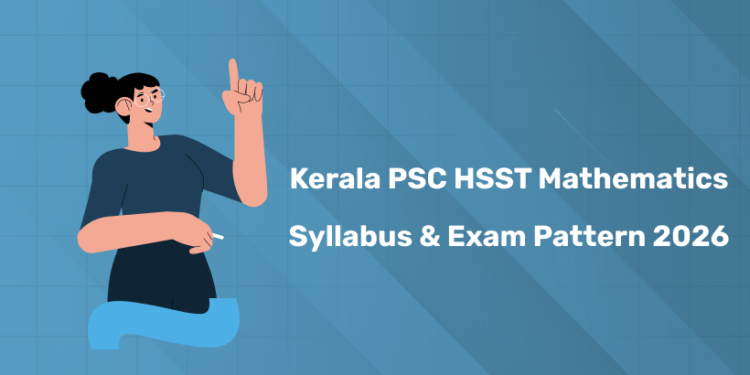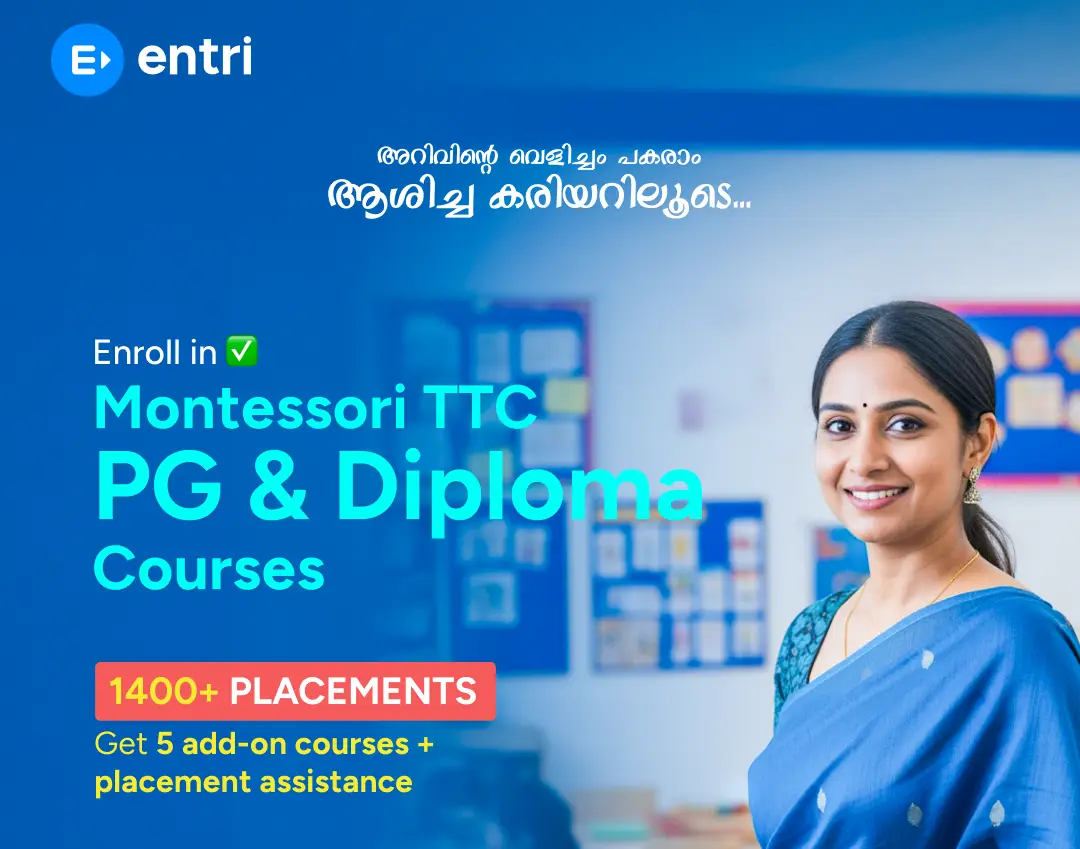Table of Contents
Kerala PSC has released the HSST Mathematics syllabus 2026 PDF and exam pattern for upcoming exams. In this blog, we provide the detailed syllabus, exam pattern, and important topics to help candidates prepare thoroughly. Stay tuned, as the exam date will be announced soon, and start planning your preparation strategy.
Kerala PSC HSST Mathematics Syllabus 2026 PDF Download
To make your preparation easier, we have attached the complete Kerala PSC HSST Mathematics syllabus 2026 PDF. You can download it directly and refer to it anytime while planning your study schedule.
Kerala PSC HSST Maths Exam 2026 Highlights
1: The first recipient of the ‘Rajiv Gandhi Khel Ratna’ award?
| Kerala PSC HSST Maths Exam 2026 | |
| Job Type | Government Job |
| Post Name | Higher Secondary School Teacher |
| Category Number | Notify Later |
| Subject | Mathematics |
| Notification Release Date | Notify Later |
| Exam Date | Notify Later |
| Admit Card | Notify Later |
| Last Date to Apply | Notify Later |
| Official Website | www.keralapsc.gov.in |
Enroll in Kerala's Top-rated HSA Coaching Program!
സർക്കാർ ജോലി എന്ന സ്വപ്നം ഇനി സ്വപ്നം മാത്രമല്ല! Join Entri's HSA Coaching Program
Join Now!Kerala PSC HSST Mathematics Previous Question Paper 2026 PDF Download
| Year / Code | |
|---|---|
| 139_2015 | |
| 101_2025 | |
| 211_2023 | |
| 532_2022 | |
| 315_2014 | |
| 705_2023 | |
| 507_2017 | |
| 484_2019 | |
| 074_2025 |
Kerala PSC HSST Mathematics Exam Pattern 2026
The HSST Mathematics exam will be conducted for 100 marks, consisting of 100 multiple-choice questions (MCQs). Candidates will have 1 hour and 30 minutes to complete the test, and the answers must be marked on an OMR sheet. Please note that there is a negative marking of 1/3 for each wrong answer, so accuracy is important. The cut-off marks will be decided based on overall performance and category-wise norms.
Kerala PSC HSST Maths Exam Pattern 2026
| Module | Topics | Marks |
|---|---|---|
| I | Linear Algebra | 7 |
| II | Real Analysis | 7 |
| III | Real Analysis (continued) | 7 |
| IV | Abstract Algebra | 7 |
| V | Abstract Algebra (continued) | 7 |
| VI | Topology | 7 |
| VII | Complex Analysis | 7 |
| VIII | Functional Analysis | 7 |
| IX | Ordinary & Partial Differential Equations | 7 |
| X | Theory of Numbers | 7 |
| Part II | Research Methodology / Teaching Aptitude | 10 |
| Part III | Indian Constitution & Kerala Renaissance | 10 |
| Part IV | General Knowledge & Current Affairs | 10 |
Kerala PSC HSST Maths Detailed Syllabus 2026
Below is the detailed Kerala PSC HSST Mathematics syllabus 2026. It covers all modules from Linear Algebra to Theory of Numbers, as well as Part II (Research Methodology & Teaching Aptitude), Part III (Indian Constitution & Kerala Renaissance), and Part IV (General Knowledge & Current Affairs). Check it out now!
PART I – MATHEMATICS
Module I – Linear Algebra (7 Marks)
-
Vector spaces, subspaces, linear dependence, basis, dimension, algebra of linear transformations.
-
Algebra of matrices, rank and determinant of matrices, linear equations.
-
Eigenvalues and eigenvectors, Cayley-Hamilton theorem.
-
Matrix representation of linear transformations.
-
Change of basis, canonical forms, diagonal forms, triangular forms, rational forms, Jordan forms.
-
Inner product spaces, orthonormal basis.
-
Quadratic form.
Module II – Real Analysis (7 Marks)
-
Sequences and series, convergence, lim sup, lim inf.
-
Bolzano-Weierstrass theorem, Heine-Borel theorem.
-
Continuity, uniform continuity, differentiability, Rolle’s theorem, Mean Value theorem.
-
Sequences and series of functions – uniform convergence.
-
Riemann sums and Riemann integral.
-
Improper integrals.
-
Double and triple integrals.
Module III – Real Analysis (continued) (7 Marks)
-
Lebesgue measure, Lebesgue integral.
-
Directional derivative, partial derivative.
-
Functions of several variables, inverse and implicit function theorems.
-
Special functions – Beta and Gamma functions.
-
Fourier series.
Module IV – Abstract Algebra (7 Marks)
-
Groups, subgroups, normal subgroups, quotient groups, homomorphisms, isomorphisms, cyclic groups, permutation groups, Cayley’s theorem.
-
Direct products, Fundamental theorem for abelian groups, class equations, Sylow theorems.
Module V – Abstract Algebra (continued) (7 Marks)
-
Rings, ideals, prime and maximal ideals, quotient rings, unique factorization domain, principal ideal domain, Euclidean domain.
-
Polynomial rings and irreducibility criteria.
-
Fields, finite fields, field extensions, Galois theory.
Module VI – Topology (7 Marks)
-
Metric spaces, continuity.
-
Topological spaces, base, subbase, countability properties, separation axioms.
-
Compact spaces, one-point compactification, locally compact spaces.
-
Connected spaces, pathwise connectedness.
-
Quotient spaces, product topology.
Module VII – Complex Analysis (7 Marks)
-
Complex numbers, polar form, properties of complex numbers.
-
Analytic functions, Cauchy-Riemann equations.
-
Conformal mappings, Möbius transformation.
-
Power series, zeros of analytic functions.
-
Liouville’s theorem.
-
Complex integration, real integrals using complex integration.
-
Cauchy’s theorem, Cauchy’s integral formula, Morera’s theorem, open mapping theorem.
-
Singularities and their classification, residues, Laurent series.
-
Schwarz lemma, Maximum modulus principle, Argument principle.
Module VIII – Functional Analysis (7 Marks)
-
Normed linear spaces, continuity of linear maps.
-
Banach spaces, Hahn-Banach theorem.
-
Open mapping theorem, closed graph theorem, uniform boundedness principle.
-
Inner product spaces, Hilbert spaces.
-
Projections, bounded operators, normal, unitary, and self-adjoint operators.
Module IX – Ordinary Differential & Partial Differential Equations (7 Marks)
-
Existence and uniqueness of solutions of initial value problems for first-order ODEs.
-
Singular solutions of first-order ODEs.
-
System of first-order ODEs.
-
General theory of homogeneous and non-homogeneous linear ODEs.
-
Lagrange and Charpit methods for solving first-order PDEs.
-
Cauchy problem for first-order PDEs.
-
Classification of second-order PDEs.
-
General solution of higher-order PDEs with constant coefficients.
-
Method of separation of variables for Laplace, Heat, and Wave equations.
Module X – Theory of Numbers (7 Marks)
-
Fundamental theorem of arithmetic, divisibility in ℤ, congruences.
-
Chinese Remainder Theorem.
-
Euler’s φ-function, Fermat’s theorem, Wilson’s theorem, Euler’s theorem.
-
Primitive roots.
PART II – RESEARCH METHODOLOGY / TEACHING APTITUDE (10 Marks)
I. Teaching Aptitude
-
Teaching: nature, objectives, characteristics, and basic requirements.
-
Learner’s characteristics.
-
Factors affecting teaching.
-
Methods of teaching.
-
Teaching aids.
-
Evaluation systems.
II. Research Aptitude
-
Research: meaning, characteristics, and types.
-
Steps of research.
-
Methods of research.
-
Research ethics.
-
Paper, article, workshop, seminar, conference, and symposium.
-
Thesis writing: characteristics and format.
PART III – INDIAN CONSTITUTION & KERALA RENAISSANCE (10 Marks)
Salient Features of Indian Constitution
-
Salient features of the Constitution, Preamble – significance and its role in interpretation.
-
Fundamental Rights, Directive Principles of State Policy – relation between them.
-
Fundamental Duties.
-
Executive, Legislature, Judiciary – at Union and State level.
-
Other constitutional authorities.
-
Centre-State relations – legislative, administrative, and financial.
-
Services under the Union and States.
-
Emergency provisions.
-
Amendment provisions of the Constitution.
Social Welfare Legislations and Programmes
-
Social service legislations: Right to Information Act, Prevention of Atrocities against Women & Children, Food Security Act, Environmental Acts, etc.
-
Social welfare programmes: Employment Guarantee Programme, Organ and Blood Donation, etc.
Renaissance in Kerala – Towards a New Society
-
Introduction to English education – various missionary organisations and their functioning, founding of educational institutions, factories, printing press, etc.
Efforts to Reform the Society
(A) Socio-Religious Reform Movements
-
SNDP Yogam, Nair Service Society, Yogakshema Sabha, Sadhu Jana Paripalana Sangham, Vaala Samudaya Parishkarani Sabha, Samathwa Samajam, Islam Dharma Paripalana Sangham, Prathyaksha Raksha Daiva Sabha, Sahodara Prasthanam, etc.
(B) Struggles and Social Revolts
-
Upper cloth revolts, Channar agitation, Vaikom Satyagraha, Guruvayoor Satyagraha, Paliyam Satyagraha, Kuttamkulam Satyagraha, Temple Entry Proclamation, Temple Entry Act, Malayalee Memorial, Ezhava Memorial, Malabar riots, Civil Disobedience Movement, Abstention movement, etc.
Role of Press in Renaissance
-
Malayalee, Swadeshabhimani, Vivekodayam, Mithavadi, Swaraj, Malayala Manorama, Bhashaposhini, Mathrubhumi, Kerala Kaumudi, Samadarsi, Kesari, Al-Ameen, Prabhatham, Yukthivadi, etc.
Awakening through Literature
-
Novel, drama, poetry, Purogamana Sahithya Prasthanam, Nataka Prasthanam, Library movement, etc.
Women and Social Change
-
Parvathi Nenmenimangalam, Arya Pallam, A.V. Kuttimalu Amma, Lalitha Prabhu, Akkamma Cheriyan, Anna Chandi, Lalithambika Antharjanam, and others.
Leaders of Renaissance
-
Thycaud Ayya Vaikundar, Sree Narayana Guru, Ayyan Kali, Chattampi Swamikal, Brahmananda Sivayogi, Vagbhadananda, Poikayil Yohannan (Kumara Guru), Dr. Palpu, Palakkunnath Abraham Malpan, Mampuram Thangal, Sahodaran Ayyappan, Pandit K.P. Karuppan, Pampadi John Joseph, Mannathu Padmanabhan, V.T. Bhattathirippad, Vakkom Abdul Khadar Maulavi, Makthi Thangal, Blessed Elias Kuriakose Chavara, Barrister G.P. Pillai, T.K. Madhavan, Moorkoth Kumaran, C. Krishnan, K.P. Kesava Menon, Dr. Ayyathan Gopalan, C.V. Kunjuraman, Kuroor Neelakantan Namboothiripad, Velukkutty Arayan, K.P. Vellon, P.K. Chathan Master, K. Kelappan, P. Krishna Pillai, A.K. Gopalan, T.R. Krishnaswami Iyer, C. Kesavan, Swami Ananda Theerthan, M.C. Joseph, Kuttippuzha Krishnapillai, and others.
Literary Figures
-
Kodungallur Kunhikkuttan Thampuran, Kerala Varma Valiyakoyi Thampuran, Kandathil Varghese Mappila, Kumaran Asan, Vallathol Narayana Menon, Ulloor S. Parameswara Iyer, G. Sankara Kurup, Changampuzha Krishna Pillai, Chandu Menon, Vaikom Muhammad Basheer, Kesav Dev, Thakazhi Sivasankara Pillai, Ponkunnam Varky, S.K. Pottakkad, and others.
PART IV – GENERAL KNOWLEDGE AND CURRENT AFFAIRS (10 Marks)
Enroll in Kerala's Top-rated HSA Coaching Program!
സർക്കാർ ജോലി എന്ന സ്വപ്നം ഇനി സ്വപ്നം മാത്രമല്ല! Join Entri's HSA Coaching Program
Join Now!How to Download Kerala PSC HSST Mathematics Syllabus 2026 PDF
- Head to the Kerala PSC website – keralapsc.gov.in.
- Go to the ‘Recruitment’ or ‘Notifications’ section where all exam updates are listed.
- Look for ‘Syllabus’ or ‘Post-wise Syllabus’ links and click on the one for HSST Mathematics.
- Open and download the PDF
- Save it for offline reference













